Contemporary Business Environment: Bentley Motors Case Study Report
VerifiedAdded on 2023/01/13
|11
|3890
|42
Report
AI Summary
This report provides a comprehensive analysis of the business environment of Bentley Motors, a prominent luxury car manufacturer in the United Kingdom. It begins with an introduction to the business environment, highlighting the influence of internal and external factors on an organization's operations and sustainability. The literature review examines how the economic environment, including economic policies, conditions, and systems, shapes Bentley Motors' behavior, particularly in the context of Brexit and its impact on the automotive sector. The non-economic environment, encompassing natural, demographic, and cultural factors, is also explored. The discussion and analysis section employs SWOT and PESTLE analyses to evaluate the company's internal strengths and weaknesses and its external opportunities and threats. The report concludes by summarizing the key findings and implications for Bentley Motors' strategic decision-making and future prospects.
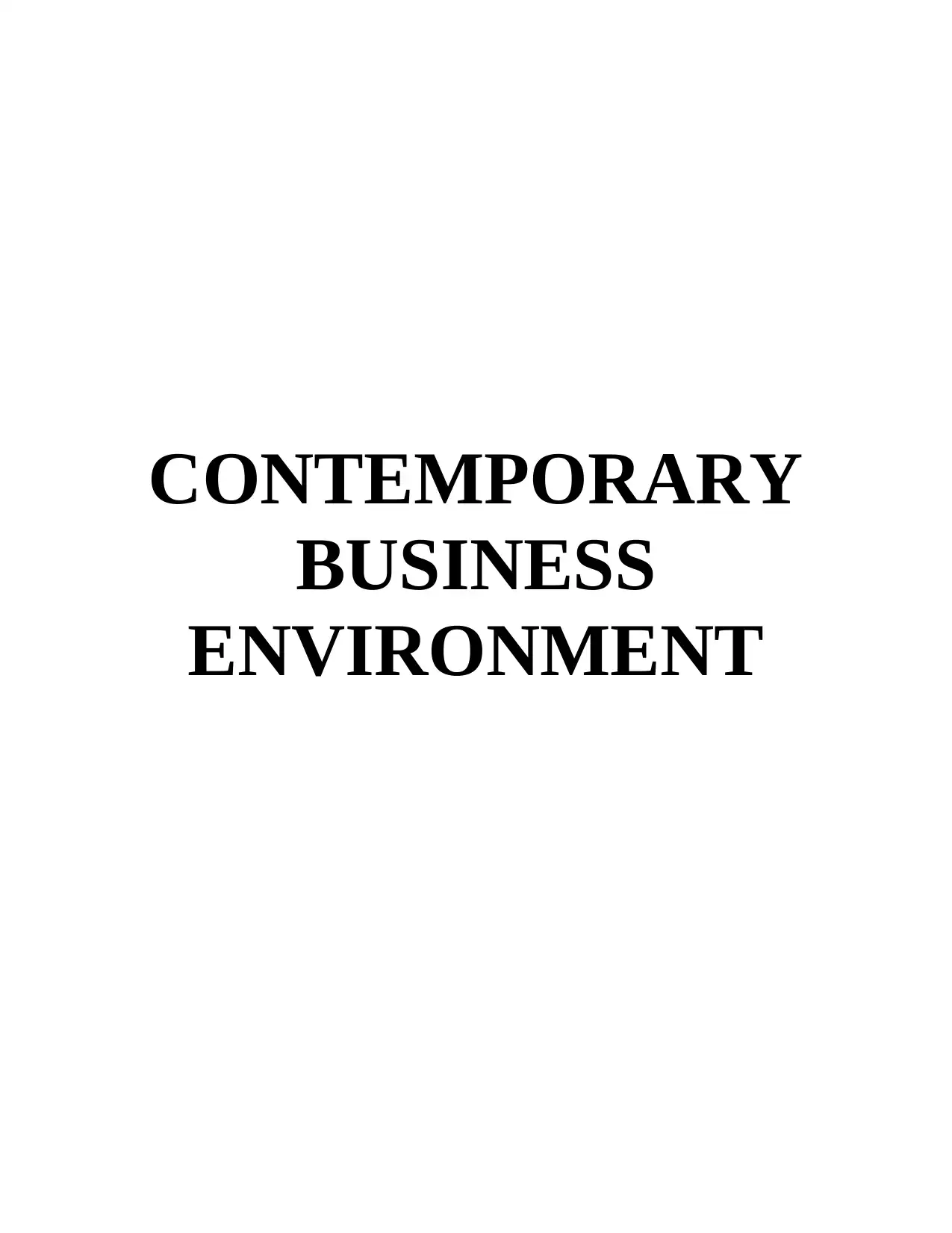
CONTEMPORARY
BUSINESS
ENVIRONMENT
BUSINESS
ENVIRONMENT
Paraphrase This Document
Need a fresh take? Get an instant paraphrase of this document with our AI Paraphraser
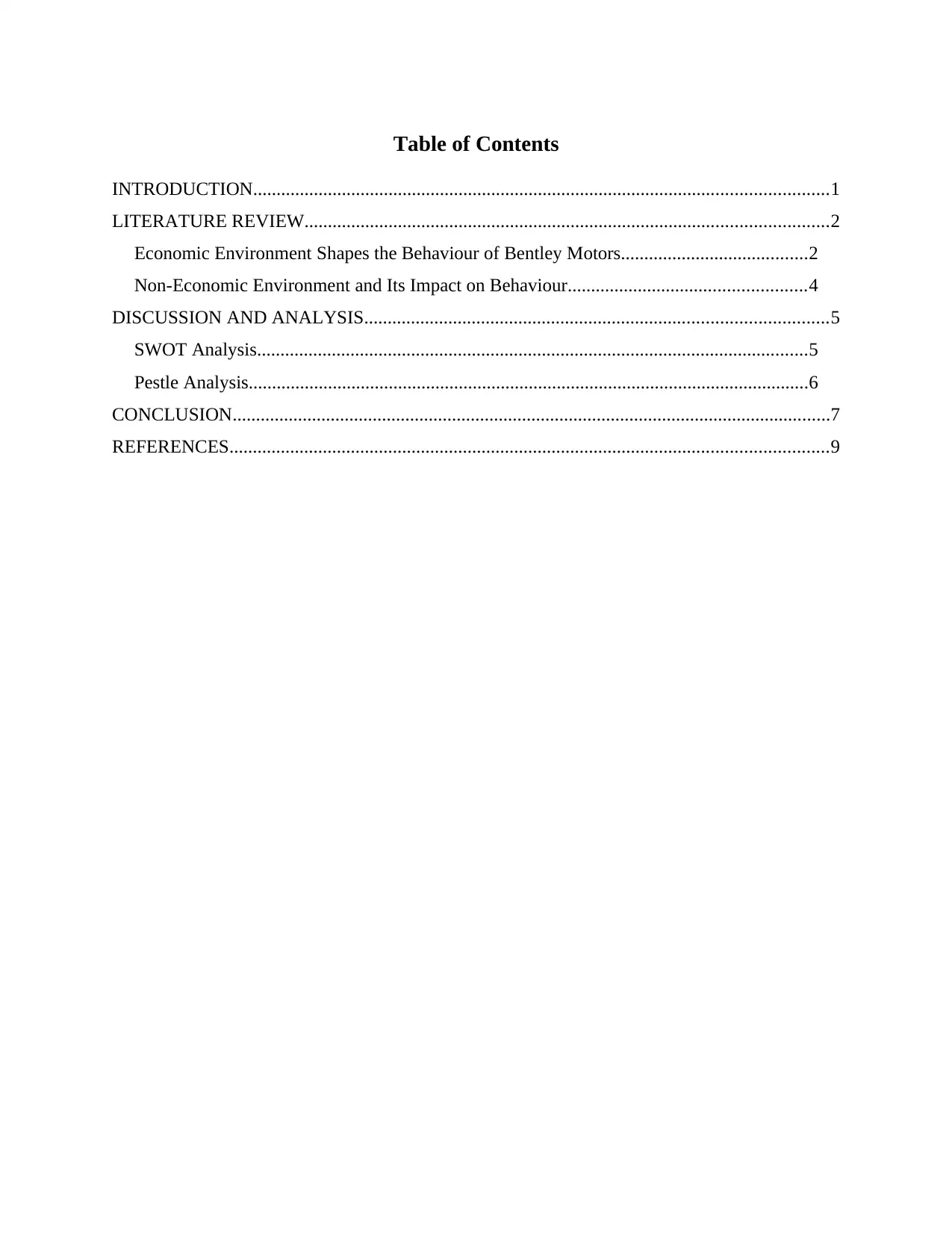
Table of Contents
INTRODUCTION...........................................................................................................................1
LITERATURE REVIEW................................................................................................................2
Economic Environment Shapes the Behaviour of Bentley Motors........................................2
Non-Economic Environment and Its Impact on Behaviour...................................................4
DISCUSSION AND ANALYSIS...................................................................................................5
SWOT Analysis......................................................................................................................5
Pestle Analysis........................................................................................................................6
CONCLUSION................................................................................................................................7
REFERENCES................................................................................................................................9
INTRODUCTION...........................................................................................................................1
LITERATURE REVIEW................................................................................................................2
Economic Environment Shapes the Behaviour of Bentley Motors........................................2
Non-Economic Environment and Its Impact on Behaviour...................................................4
DISCUSSION AND ANALYSIS...................................................................................................5
SWOT Analysis......................................................................................................................5
Pestle Analysis........................................................................................................................6
CONCLUSION................................................................................................................................7
REFERENCES................................................................................................................................9
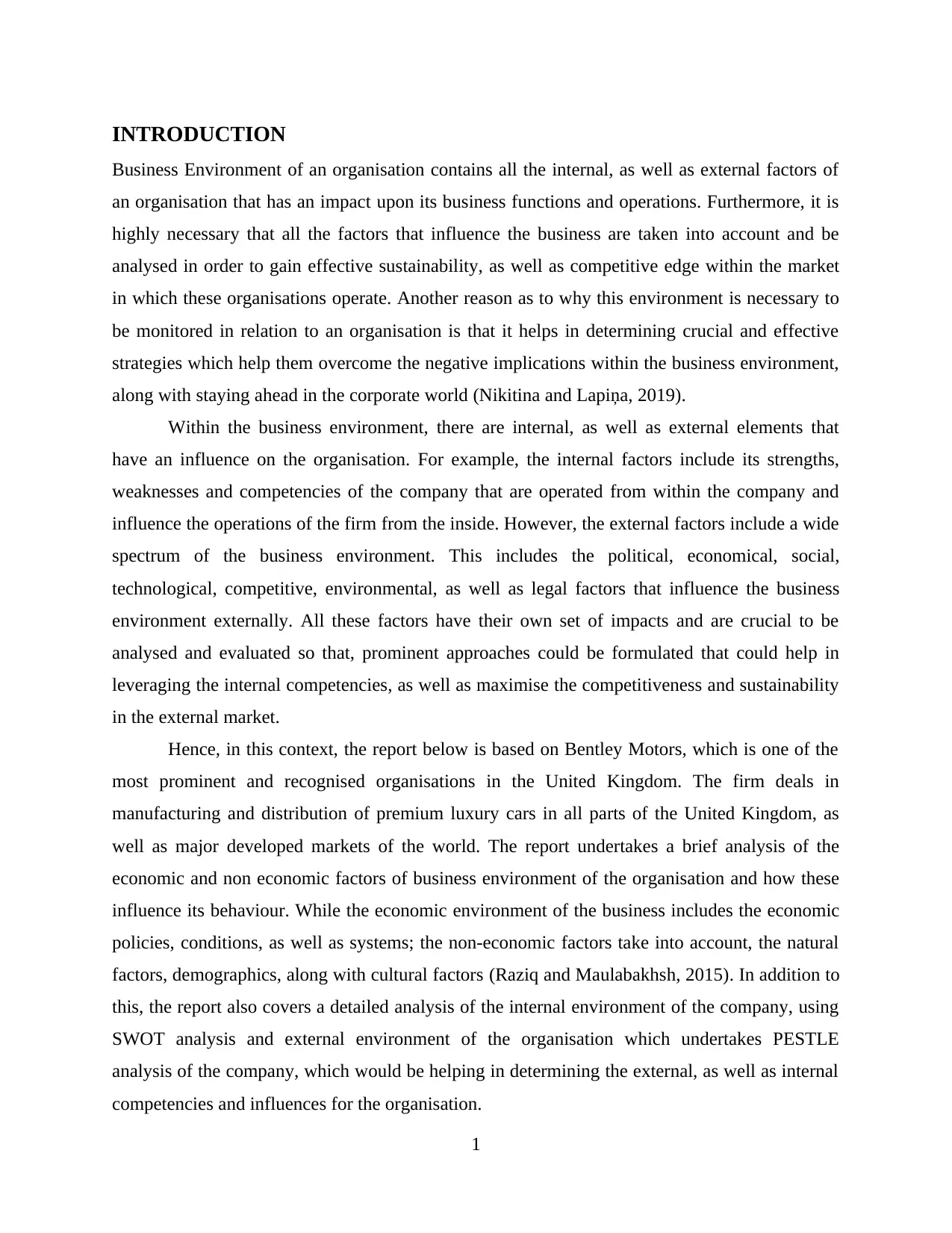
INTRODUCTION
Business Environment of an organisation contains all the internal, as well as external factors of
an organisation that has an impact upon its business functions and operations. Furthermore, it is
highly necessary that all the factors that influence the business are taken into account and be
analysed in order to gain effective sustainability, as well as competitive edge within the market
in which these organisations operate. Another reason as to why this environment is necessary to
be monitored in relation to an organisation is that it helps in determining crucial and effective
strategies which help them overcome the negative implications within the business environment,
along with staying ahead in the corporate world (Nikitina and Lapiņa, 2019).
Within the business environment, there are internal, as well as external elements that
have an influence on the organisation. For example, the internal factors include its strengths,
weaknesses and competencies of the company that are operated from within the company and
influence the operations of the firm from the inside. However, the external factors include a wide
spectrum of the business environment. This includes the political, economical, social,
technological, competitive, environmental, as well as legal factors that influence the business
environment externally. All these factors have their own set of impacts and are crucial to be
analysed and evaluated so that, prominent approaches could be formulated that could help in
leveraging the internal competencies, as well as maximise the competitiveness and sustainability
in the external market.
Hence, in this context, the report below is based on Bentley Motors, which is one of the
most prominent and recognised organisations in the United Kingdom. The firm deals in
manufacturing and distribution of premium luxury cars in all parts of the United Kingdom, as
well as major developed markets of the world. The report undertakes a brief analysis of the
economic and non economic factors of business environment of the organisation and how these
influence its behaviour. While the economic environment of the business includes the economic
policies, conditions, as well as systems; the non-economic factors take into account, the natural
factors, demographics, along with cultural factors (Raziq and Maulabakhsh, 2015). In addition to
this, the report also covers a detailed analysis of the internal environment of the company, using
SWOT analysis and external environment of the organisation which undertakes PESTLE
analysis of the company, which would be helping in determining the external, as well as internal
competencies and influences for the organisation.
1
Business Environment of an organisation contains all the internal, as well as external factors of
an organisation that has an impact upon its business functions and operations. Furthermore, it is
highly necessary that all the factors that influence the business are taken into account and be
analysed in order to gain effective sustainability, as well as competitive edge within the market
in which these organisations operate. Another reason as to why this environment is necessary to
be monitored in relation to an organisation is that it helps in determining crucial and effective
strategies which help them overcome the negative implications within the business environment,
along with staying ahead in the corporate world (Nikitina and Lapiņa, 2019).
Within the business environment, there are internal, as well as external elements that
have an influence on the organisation. For example, the internal factors include its strengths,
weaknesses and competencies of the company that are operated from within the company and
influence the operations of the firm from the inside. However, the external factors include a wide
spectrum of the business environment. This includes the political, economical, social,
technological, competitive, environmental, as well as legal factors that influence the business
environment externally. All these factors have their own set of impacts and are crucial to be
analysed and evaluated so that, prominent approaches could be formulated that could help in
leveraging the internal competencies, as well as maximise the competitiveness and sustainability
in the external market.
Hence, in this context, the report below is based on Bentley Motors, which is one of the
most prominent and recognised organisations in the United Kingdom. The firm deals in
manufacturing and distribution of premium luxury cars in all parts of the United Kingdom, as
well as major developed markets of the world. The report undertakes a brief analysis of the
economic and non economic factors of business environment of the organisation and how these
influence its behaviour. While the economic environment of the business includes the economic
policies, conditions, as well as systems; the non-economic factors take into account, the natural
factors, demographics, along with cultural factors (Raziq and Maulabakhsh, 2015). In addition to
this, the report also covers a detailed analysis of the internal environment of the company, using
SWOT analysis and external environment of the organisation which undertakes PESTLE
analysis of the company, which would be helping in determining the external, as well as internal
competencies and influences for the organisation.
1
⊘ This is a preview!⊘
Do you want full access?
Subscribe today to unlock all pages.

Trusted by 1+ million students worldwide
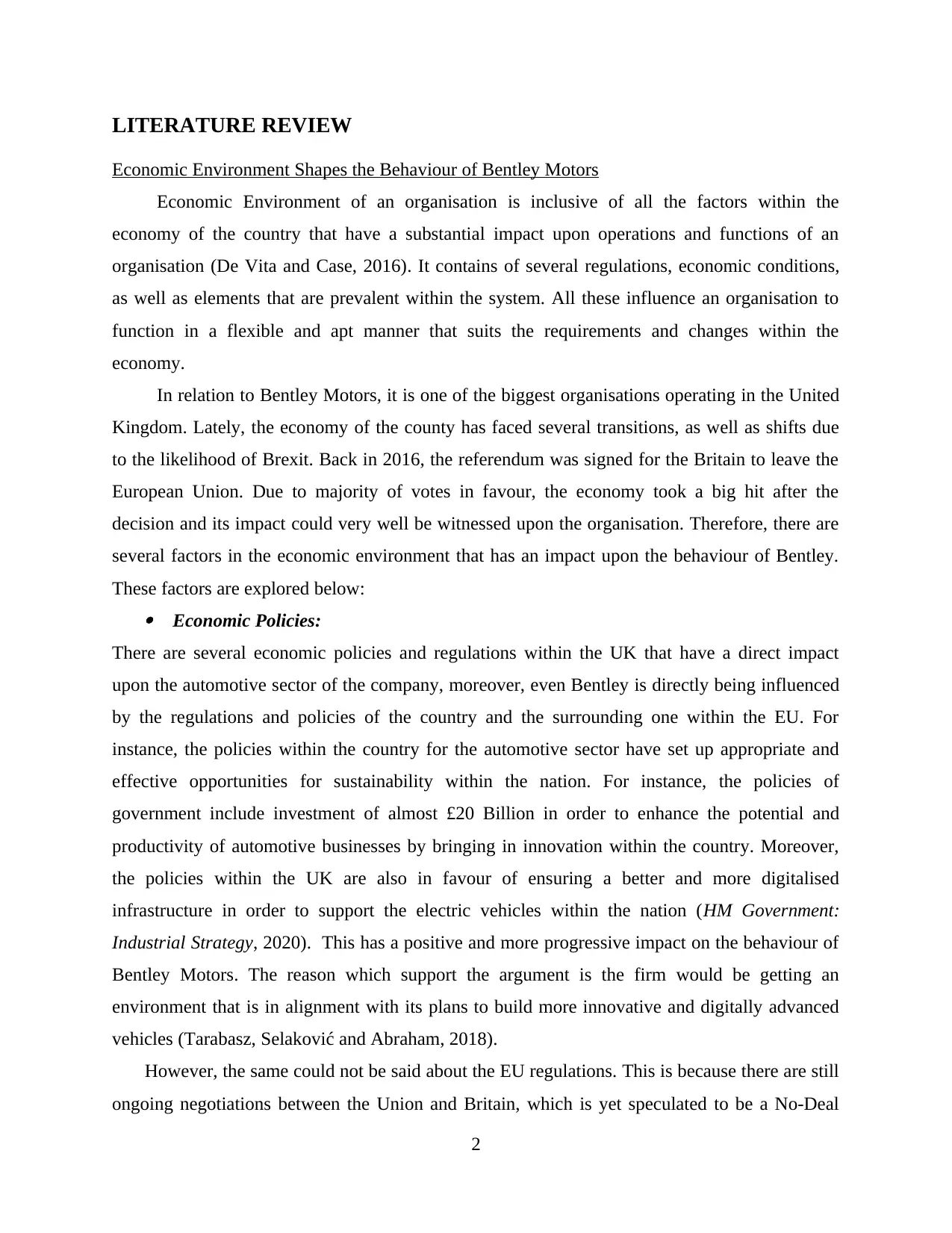
LITERATURE REVIEW
Economic Environment Shapes the Behaviour of Bentley Motors
Economic Environment of an organisation is inclusive of all the factors within the
economy of the country that have a substantial impact upon operations and functions of an
organisation (De Vita and Case, 2016). It contains of several regulations, economic conditions,
as well as elements that are prevalent within the system. All these influence an organisation to
function in a flexible and apt manner that suits the requirements and changes within the
economy.
In relation to Bentley Motors, it is one of the biggest organisations operating in the United
Kingdom. Lately, the economy of the county has faced several transitions, as well as shifts due
to the likelihood of Brexit. Back in 2016, the referendum was signed for the Britain to leave the
European Union. Due to majority of votes in favour, the economy took a big hit after the
decision and its impact could very well be witnessed upon the organisation. Therefore, there are
several factors in the economic environment that has an impact upon the behaviour of Bentley.
These factors are explored below: Economic Policies:
There are several economic policies and regulations within the UK that have a direct impact
upon the automotive sector of the company, moreover, even Bentley is directly being influenced
by the regulations and policies of the country and the surrounding one within the EU. For
instance, the policies within the country for the automotive sector have set up appropriate and
effective opportunities for sustainability within the nation. For instance, the policies of
government include investment of almost £20 Billion in order to enhance the potential and
productivity of automotive businesses by bringing in innovation within the country. Moreover,
the policies within the UK are also in favour of ensuring a better and more digitalised
infrastructure in order to support the electric vehicles within the nation (HM Government:
Industrial Strategy, 2020). This has a positive and more progressive impact on the behaviour of
Bentley Motors. The reason which support the argument is the firm would be getting an
environment that is in alignment with its plans to build more innovative and digitally advanced
vehicles (Tarabasz, Selaković and Abraham, 2018).
However, the same could not be said about the EU regulations. This is because there are still
ongoing negotiations between the Union and Britain, which is yet speculated to be a No-Deal
2
Economic Environment Shapes the Behaviour of Bentley Motors
Economic Environment of an organisation is inclusive of all the factors within the
economy of the country that have a substantial impact upon operations and functions of an
organisation (De Vita and Case, 2016). It contains of several regulations, economic conditions,
as well as elements that are prevalent within the system. All these influence an organisation to
function in a flexible and apt manner that suits the requirements and changes within the
economy.
In relation to Bentley Motors, it is one of the biggest organisations operating in the United
Kingdom. Lately, the economy of the county has faced several transitions, as well as shifts due
to the likelihood of Brexit. Back in 2016, the referendum was signed for the Britain to leave the
European Union. Due to majority of votes in favour, the economy took a big hit after the
decision and its impact could very well be witnessed upon the organisation. Therefore, there are
several factors in the economic environment that has an impact upon the behaviour of Bentley.
These factors are explored below: Economic Policies:
There are several economic policies and regulations within the UK that have a direct impact
upon the automotive sector of the company, moreover, even Bentley is directly being influenced
by the regulations and policies of the country and the surrounding one within the EU. For
instance, the policies within the country for the automotive sector have set up appropriate and
effective opportunities for sustainability within the nation. For instance, the policies of
government include investment of almost £20 Billion in order to enhance the potential and
productivity of automotive businesses by bringing in innovation within the country. Moreover,
the policies within the UK are also in favour of ensuring a better and more digitalised
infrastructure in order to support the electric vehicles within the nation (HM Government:
Industrial Strategy, 2020). This has a positive and more progressive impact on the behaviour of
Bentley Motors. The reason which support the argument is the firm would be getting an
environment that is in alignment with its plans to build more innovative and digitally advanced
vehicles (Tarabasz, Selaković and Abraham, 2018).
However, the same could not be said about the EU regulations. This is because there are still
ongoing negotiations between the Union and Britain, which is yet speculated to be a No-Deal
2
Paraphrase This Document
Need a fresh take? Get an instant paraphrase of this document with our AI Paraphraser
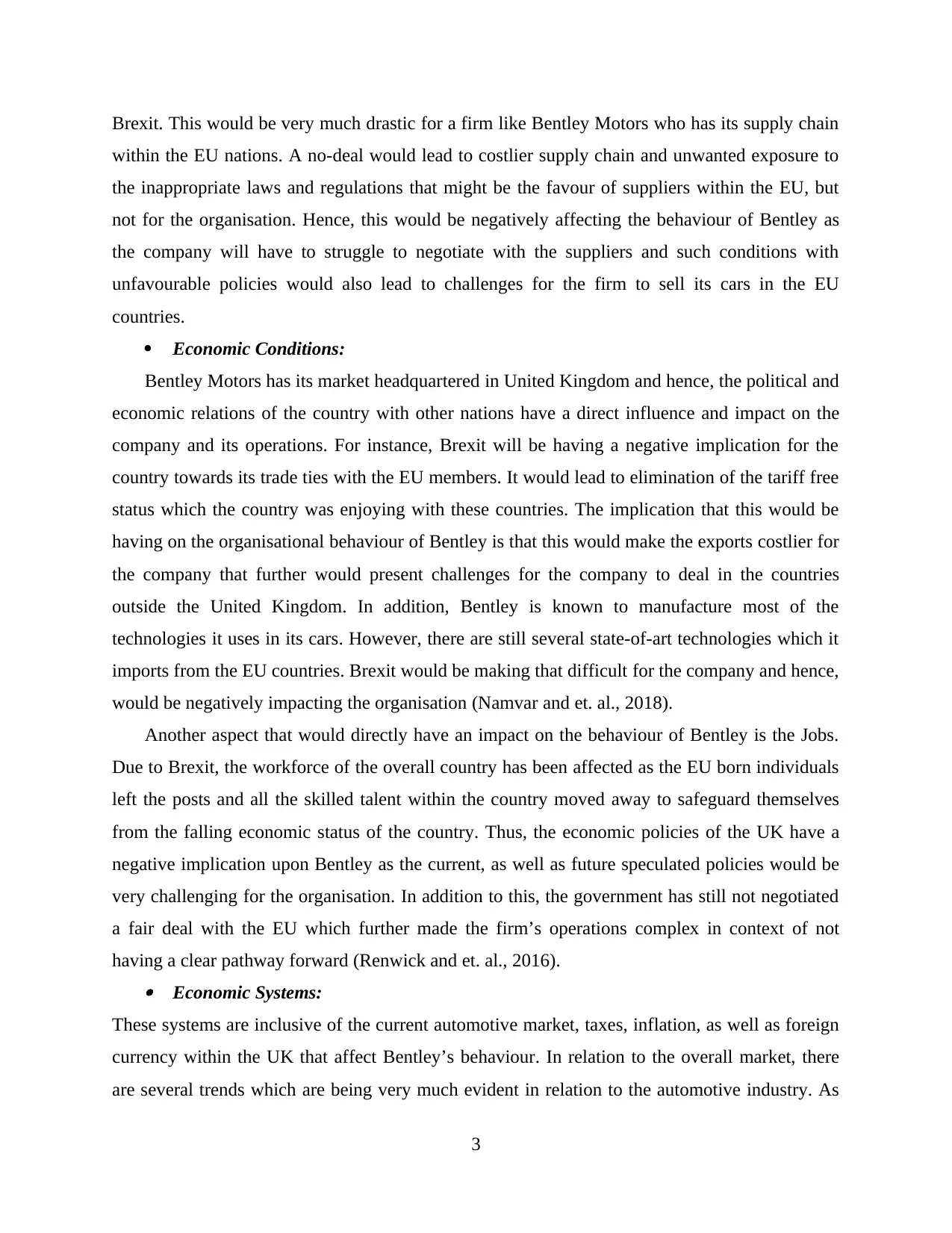
Brexit. This would be very much drastic for a firm like Bentley Motors who has its supply chain
within the EU nations. A no-deal would lead to costlier supply chain and unwanted exposure to
the inappropriate laws and regulations that might be the favour of suppliers within the EU, but
not for the organisation. Hence, this would be negatively affecting the behaviour of Bentley as
the company will have to struggle to negotiate with the suppliers and such conditions with
unfavourable policies would also lead to challenges for the firm to sell its cars in the EU
countries.
Economic Conditions:
Bentley Motors has its market headquartered in United Kingdom and hence, the political and
economic relations of the country with other nations have a direct influence and impact on the
company and its operations. For instance, Brexit will be having a negative implication for the
country towards its trade ties with the EU members. It would lead to elimination of the tariff free
status which the country was enjoying with these countries. The implication that this would be
having on the organisational behaviour of Bentley is that this would make the exports costlier for
the company that further would present challenges for the company to deal in the countries
outside the United Kingdom. In addition, Bentley is known to manufacture most of the
technologies it uses in its cars. However, there are still several state-of-art technologies which it
imports from the EU countries. Brexit would be making that difficult for the company and hence,
would be negatively impacting the organisation (Namvar and et. al., 2018).
Another aspect that would directly have an impact on the behaviour of Bentley is the Jobs.
Due to Brexit, the workforce of the overall country has been affected as the EU born individuals
left the posts and all the skilled talent within the country moved away to safeguard themselves
from the falling economic status of the country. Thus, the economic policies of the UK have a
negative implication upon Bentley as the current, as well as future speculated policies would be
very challenging for the organisation. In addition to this, the government has still not negotiated
a fair deal with the EU which further made the firm’s operations complex in context of not
having a clear pathway forward (Renwick and et. al., 2016). Economic Systems:
These systems are inclusive of the current automotive market, taxes, inflation, as well as foreign
currency within the UK that affect Bentley’s behaviour. In relation to the overall market, there
are several trends which are being very much evident in relation to the automotive industry. As
3
within the EU nations. A no-deal would lead to costlier supply chain and unwanted exposure to
the inappropriate laws and regulations that might be the favour of suppliers within the EU, but
not for the organisation. Hence, this would be negatively affecting the behaviour of Bentley as
the company will have to struggle to negotiate with the suppliers and such conditions with
unfavourable policies would also lead to challenges for the firm to sell its cars in the EU
countries.
Economic Conditions:
Bentley Motors has its market headquartered in United Kingdom and hence, the political and
economic relations of the country with other nations have a direct influence and impact on the
company and its operations. For instance, Brexit will be having a negative implication for the
country towards its trade ties with the EU members. It would lead to elimination of the tariff free
status which the country was enjoying with these countries. The implication that this would be
having on the organisational behaviour of Bentley is that this would make the exports costlier for
the company that further would present challenges for the company to deal in the countries
outside the United Kingdom. In addition, Bentley is known to manufacture most of the
technologies it uses in its cars. However, there are still several state-of-art technologies which it
imports from the EU countries. Brexit would be making that difficult for the company and hence,
would be negatively impacting the organisation (Namvar and et. al., 2018).
Another aspect that would directly have an impact on the behaviour of Bentley is the Jobs.
Due to Brexit, the workforce of the overall country has been affected as the EU born individuals
left the posts and all the skilled talent within the country moved away to safeguard themselves
from the falling economic status of the country. Thus, the economic policies of the UK have a
negative implication upon Bentley as the current, as well as future speculated policies would be
very challenging for the organisation. In addition to this, the government has still not negotiated
a fair deal with the EU which further made the firm’s operations complex in context of not
having a clear pathway forward (Renwick and et. al., 2016). Economic Systems:
These systems are inclusive of the current automotive market, taxes, inflation, as well as foreign
currency within the UK that affect Bentley’s behaviour. In relation to the overall market, there
are several trends which are being very much evident in relation to the automotive industry. As
3
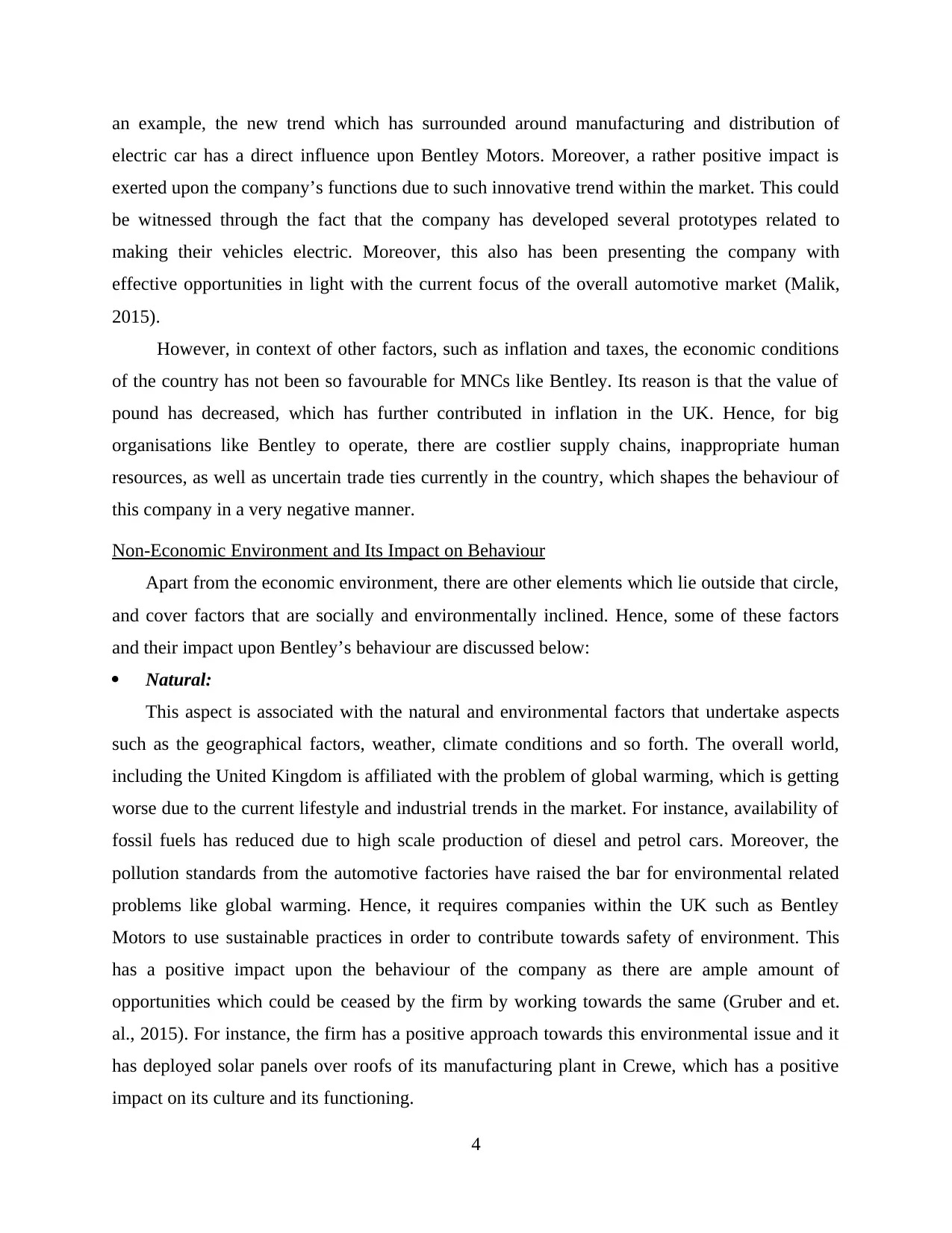
an example, the new trend which has surrounded around manufacturing and distribution of
electric car has a direct influence upon Bentley Motors. Moreover, a rather positive impact is
exerted upon the company’s functions due to such innovative trend within the market. This could
be witnessed through the fact that the company has developed several prototypes related to
making their vehicles electric. Moreover, this also has been presenting the company with
effective opportunities in light with the current focus of the overall automotive market (Malik,
2015).
However, in context of other factors, such as inflation and taxes, the economic conditions
of the country has not been so favourable for MNCs like Bentley. Its reason is that the value of
pound has decreased, which has further contributed in inflation in the UK. Hence, for big
organisations like Bentley to operate, there are costlier supply chains, inappropriate human
resources, as well as uncertain trade ties currently in the country, which shapes the behaviour of
this company in a very negative manner.
Non-Economic Environment and Its Impact on Behaviour
Apart from the economic environment, there are other elements which lie outside that circle,
and cover factors that are socially and environmentally inclined. Hence, some of these factors
and their impact upon Bentley’s behaviour are discussed below:
Natural:
This aspect is associated with the natural and environmental factors that undertake aspects
such as the geographical factors, weather, climate conditions and so forth. The overall world,
including the United Kingdom is affiliated with the problem of global warming, which is getting
worse due to the current lifestyle and industrial trends in the market. For instance, availability of
fossil fuels has reduced due to high scale production of diesel and petrol cars. Moreover, the
pollution standards from the automotive factories have raised the bar for environmental related
problems like global warming. Hence, it requires companies within the UK such as Bentley
Motors to use sustainable practices in order to contribute towards safety of environment. This
has a positive impact upon the behaviour of the company as there are ample amount of
opportunities which could be ceased by the firm by working towards the same (Gruber and et.
al., 2015). For instance, the firm has a positive approach towards this environmental issue and it
has deployed solar panels over roofs of its manufacturing plant in Crewe, which has a positive
impact on its culture and its functioning.
4
electric car has a direct influence upon Bentley Motors. Moreover, a rather positive impact is
exerted upon the company’s functions due to such innovative trend within the market. This could
be witnessed through the fact that the company has developed several prototypes related to
making their vehicles electric. Moreover, this also has been presenting the company with
effective opportunities in light with the current focus of the overall automotive market (Malik,
2015).
However, in context of other factors, such as inflation and taxes, the economic conditions
of the country has not been so favourable for MNCs like Bentley. Its reason is that the value of
pound has decreased, which has further contributed in inflation in the UK. Hence, for big
organisations like Bentley to operate, there are costlier supply chains, inappropriate human
resources, as well as uncertain trade ties currently in the country, which shapes the behaviour of
this company in a very negative manner.
Non-Economic Environment and Its Impact on Behaviour
Apart from the economic environment, there are other elements which lie outside that circle,
and cover factors that are socially and environmentally inclined. Hence, some of these factors
and their impact upon Bentley’s behaviour are discussed below:
Natural:
This aspect is associated with the natural and environmental factors that undertake aspects
such as the geographical factors, weather, climate conditions and so forth. The overall world,
including the United Kingdom is affiliated with the problem of global warming, which is getting
worse due to the current lifestyle and industrial trends in the market. For instance, availability of
fossil fuels has reduced due to high scale production of diesel and petrol cars. Moreover, the
pollution standards from the automotive factories have raised the bar for environmental related
problems like global warming. Hence, it requires companies within the UK such as Bentley
Motors to use sustainable practices in order to contribute towards safety of environment. This
has a positive impact upon the behaviour of the company as there are ample amount of
opportunities which could be ceased by the firm by working towards the same (Gruber and et.
al., 2015). For instance, the firm has a positive approach towards this environmental issue and it
has deployed solar panels over roofs of its manufacturing plant in Crewe, which has a positive
impact on its culture and its functioning.
4
⊘ This is a preview!⊘
Do you want full access?
Subscribe today to unlock all pages.

Trusted by 1+ million students worldwide
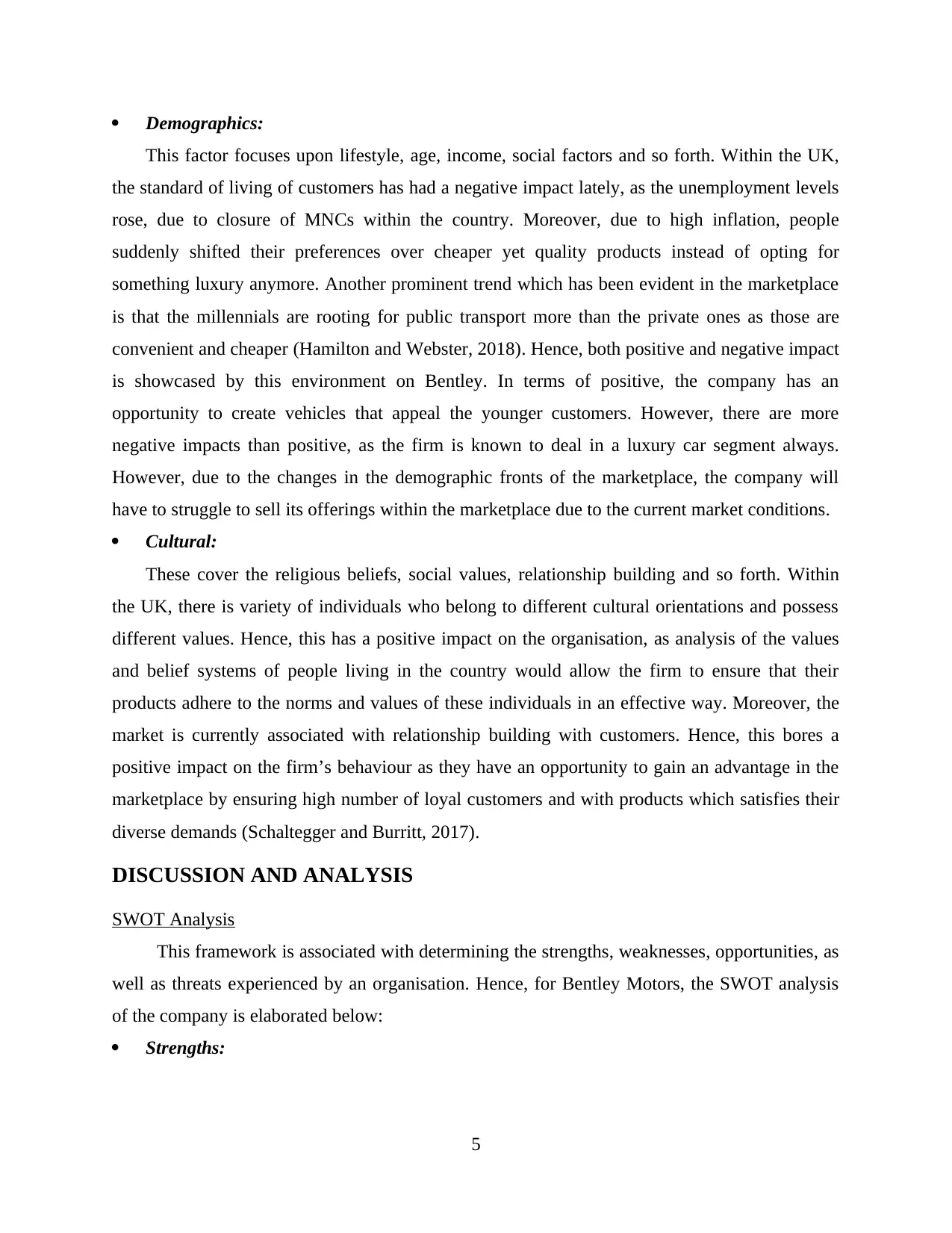
Demographics:
This factor focuses upon lifestyle, age, income, social factors and so forth. Within the UK,
the standard of living of customers has had a negative impact lately, as the unemployment levels
rose, due to closure of MNCs within the country. Moreover, due to high inflation, people
suddenly shifted their preferences over cheaper yet quality products instead of opting for
something luxury anymore. Another prominent trend which has been evident in the marketplace
is that the millennials are rooting for public transport more than the private ones as those are
convenient and cheaper (Hamilton and Webster, 2018). Hence, both positive and negative impact
is showcased by this environment on Bentley. In terms of positive, the company has an
opportunity to create vehicles that appeal the younger customers. However, there are more
negative impacts than positive, as the firm is known to deal in a luxury car segment always.
However, due to the changes in the demographic fronts of the marketplace, the company will
have to struggle to sell its offerings within the marketplace due to the current market conditions.
Cultural:
These cover the religious beliefs, social values, relationship building and so forth. Within
the UK, there is variety of individuals who belong to different cultural orientations and possess
different values. Hence, this has a positive impact on the organisation, as analysis of the values
and belief systems of people living in the country would allow the firm to ensure that their
products adhere to the norms and values of these individuals in an effective way. Moreover, the
market is currently associated with relationship building with customers. Hence, this bores a
positive impact on the firm’s behaviour as they have an opportunity to gain an advantage in the
marketplace by ensuring high number of loyal customers and with products which satisfies their
diverse demands (Schaltegger and Burritt, 2017).
DISCUSSION AND ANALYSIS
SWOT Analysis
This framework is associated with determining the strengths, weaknesses, opportunities, as
well as threats experienced by an organisation. Hence, for Bentley Motors, the SWOT analysis
of the company is elaborated below:
Strengths:
5
This factor focuses upon lifestyle, age, income, social factors and so forth. Within the UK,
the standard of living of customers has had a negative impact lately, as the unemployment levels
rose, due to closure of MNCs within the country. Moreover, due to high inflation, people
suddenly shifted their preferences over cheaper yet quality products instead of opting for
something luxury anymore. Another prominent trend which has been evident in the marketplace
is that the millennials are rooting for public transport more than the private ones as those are
convenient and cheaper (Hamilton and Webster, 2018). Hence, both positive and negative impact
is showcased by this environment on Bentley. In terms of positive, the company has an
opportunity to create vehicles that appeal the younger customers. However, there are more
negative impacts than positive, as the firm is known to deal in a luxury car segment always.
However, due to the changes in the demographic fronts of the marketplace, the company will
have to struggle to sell its offerings within the marketplace due to the current market conditions.
Cultural:
These cover the religious beliefs, social values, relationship building and so forth. Within
the UK, there is variety of individuals who belong to different cultural orientations and possess
different values. Hence, this has a positive impact on the organisation, as analysis of the values
and belief systems of people living in the country would allow the firm to ensure that their
products adhere to the norms and values of these individuals in an effective way. Moreover, the
market is currently associated with relationship building with customers. Hence, this bores a
positive impact on the firm’s behaviour as they have an opportunity to gain an advantage in the
marketplace by ensuring high number of loyal customers and with products which satisfies their
diverse demands (Schaltegger and Burritt, 2017).
DISCUSSION AND ANALYSIS
SWOT Analysis
This framework is associated with determining the strengths, weaknesses, opportunities, as
well as threats experienced by an organisation. Hence, for Bentley Motors, the SWOT analysis
of the company is elaborated below:
Strengths:
5
Paraphrase This Document
Need a fresh take? Get an instant paraphrase of this document with our AI Paraphraser
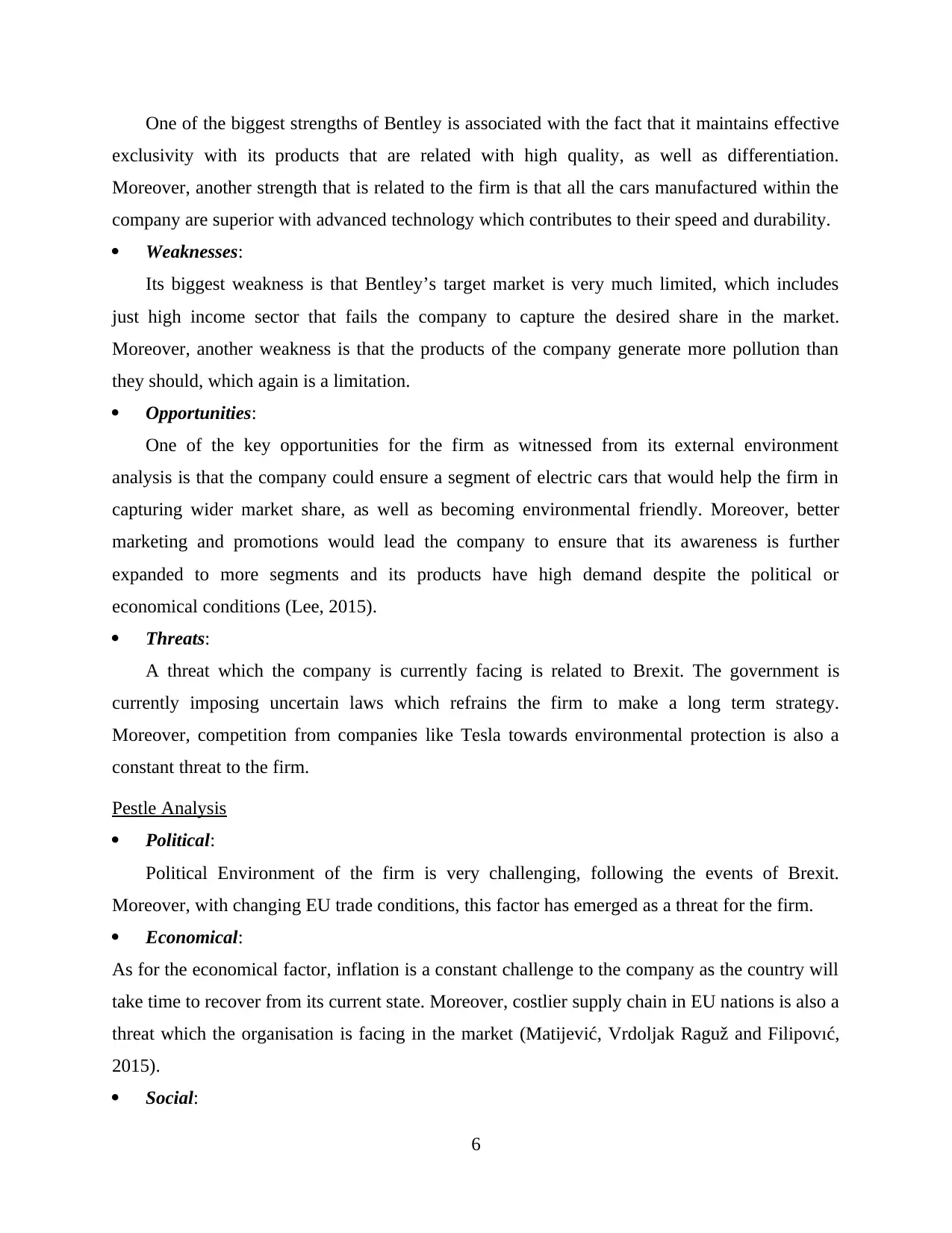
One of the biggest strengths of Bentley is associated with the fact that it maintains effective
exclusivity with its products that are related with high quality, as well as differentiation.
Moreover, another strength that is related to the firm is that all the cars manufactured within the
company are superior with advanced technology which contributes to their speed and durability.
Weaknesses:
Its biggest weakness is that Bentley’s target market is very much limited, which includes
just high income sector that fails the company to capture the desired share in the market.
Moreover, another weakness is that the products of the company generate more pollution than
they should, which again is a limitation.
Opportunities:
One of the key opportunities for the firm as witnessed from its external environment
analysis is that the company could ensure a segment of electric cars that would help the firm in
capturing wider market share, as well as becoming environmental friendly. Moreover, better
marketing and promotions would lead the company to ensure that its awareness is further
expanded to more segments and its products have high demand despite the political or
economical conditions (Lee, 2015).
Threats:
A threat which the company is currently facing is related to Brexit. The government is
currently imposing uncertain laws which refrains the firm to make a long term strategy.
Moreover, competition from companies like Tesla towards environmental protection is also a
constant threat to the firm.
Pestle Analysis
Political:
Political Environment of the firm is very challenging, following the events of Brexit.
Moreover, with changing EU trade conditions, this factor has emerged as a threat for the firm.
Economical:
As for the economical factor, inflation is a constant challenge to the company as the country will
take time to recover from its current state. Moreover, costlier supply chain in EU nations is also a
threat which the organisation is facing in the market (Matijević, Vrdoljak Raguž and Filipovıć,
2015).
Social:
6
exclusivity with its products that are related with high quality, as well as differentiation.
Moreover, another strength that is related to the firm is that all the cars manufactured within the
company are superior with advanced technology which contributes to their speed and durability.
Weaknesses:
Its biggest weakness is that Bentley’s target market is very much limited, which includes
just high income sector that fails the company to capture the desired share in the market.
Moreover, another weakness is that the products of the company generate more pollution than
they should, which again is a limitation.
Opportunities:
One of the key opportunities for the firm as witnessed from its external environment
analysis is that the company could ensure a segment of electric cars that would help the firm in
capturing wider market share, as well as becoming environmental friendly. Moreover, better
marketing and promotions would lead the company to ensure that its awareness is further
expanded to more segments and its products have high demand despite the political or
economical conditions (Lee, 2015).
Threats:
A threat which the company is currently facing is related to Brexit. The government is
currently imposing uncertain laws which refrains the firm to make a long term strategy.
Moreover, competition from companies like Tesla towards environmental protection is also a
constant threat to the firm.
Pestle Analysis
Political:
Political Environment of the firm is very challenging, following the events of Brexit.
Moreover, with changing EU trade conditions, this factor has emerged as a threat for the firm.
Economical:
As for the economical factor, inflation is a constant challenge to the company as the country will
take time to recover from its current state. Moreover, costlier supply chain in EU nations is also a
threat which the organisation is facing in the market (Matijević, Vrdoljak Raguž and Filipovıć,
2015).
Social:
6
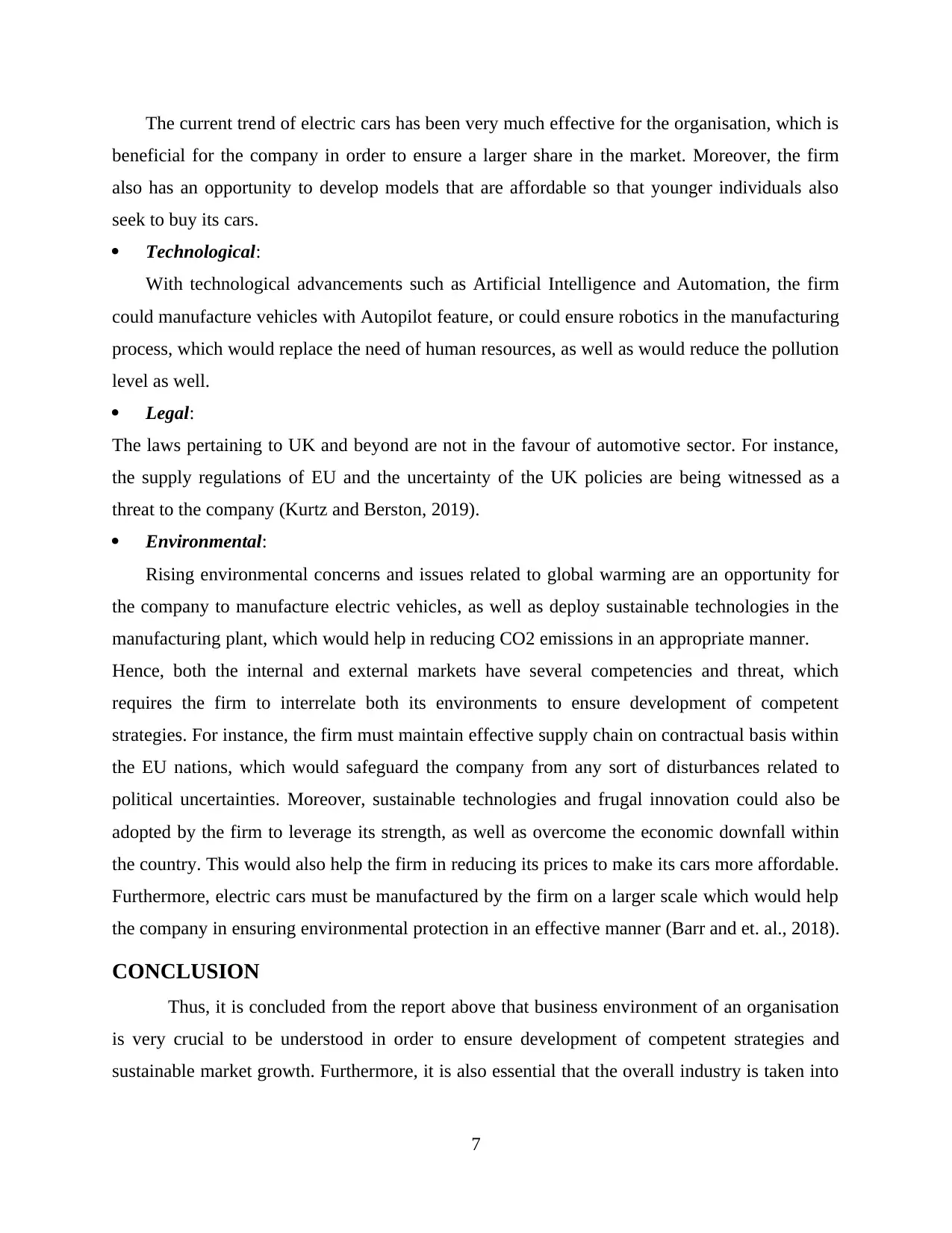
The current trend of electric cars has been very much effective for the organisation, which is
beneficial for the company in order to ensure a larger share in the market. Moreover, the firm
also has an opportunity to develop models that are affordable so that younger individuals also
seek to buy its cars.
Technological:
With technological advancements such as Artificial Intelligence and Automation, the firm
could manufacture vehicles with Autopilot feature, or could ensure robotics in the manufacturing
process, which would replace the need of human resources, as well as would reduce the pollution
level as well.
Legal:
The laws pertaining to UK and beyond are not in the favour of automotive sector. For instance,
the supply regulations of EU and the uncertainty of the UK policies are being witnessed as a
threat to the company (Kurtz and Berston, 2019).
Environmental:
Rising environmental concerns and issues related to global warming are an opportunity for
the company to manufacture electric vehicles, as well as deploy sustainable technologies in the
manufacturing plant, which would help in reducing CO2 emissions in an appropriate manner.
Hence, both the internal and external markets have several competencies and threat, which
requires the firm to interrelate both its environments to ensure development of competent
strategies. For instance, the firm must maintain effective supply chain on contractual basis within
the EU nations, which would safeguard the company from any sort of disturbances related to
political uncertainties. Moreover, sustainable technologies and frugal innovation could also be
adopted by the firm to leverage its strength, as well as overcome the economic downfall within
the country. This would also help the firm in reducing its prices to make its cars more affordable.
Furthermore, electric cars must be manufactured by the firm on a larger scale which would help
the company in ensuring environmental protection in an effective manner (Barr and et. al., 2018).
CONCLUSION
Thus, it is concluded from the report above that business environment of an organisation
is very crucial to be understood in order to ensure development of competent strategies and
sustainable market growth. Furthermore, it is also essential that the overall industry is taken into
7
beneficial for the company in order to ensure a larger share in the market. Moreover, the firm
also has an opportunity to develop models that are affordable so that younger individuals also
seek to buy its cars.
Technological:
With technological advancements such as Artificial Intelligence and Automation, the firm
could manufacture vehicles with Autopilot feature, or could ensure robotics in the manufacturing
process, which would replace the need of human resources, as well as would reduce the pollution
level as well.
Legal:
The laws pertaining to UK and beyond are not in the favour of automotive sector. For instance,
the supply regulations of EU and the uncertainty of the UK policies are being witnessed as a
threat to the company (Kurtz and Berston, 2019).
Environmental:
Rising environmental concerns and issues related to global warming are an opportunity for
the company to manufacture electric vehicles, as well as deploy sustainable technologies in the
manufacturing plant, which would help in reducing CO2 emissions in an appropriate manner.
Hence, both the internal and external markets have several competencies and threat, which
requires the firm to interrelate both its environments to ensure development of competent
strategies. For instance, the firm must maintain effective supply chain on contractual basis within
the EU nations, which would safeguard the company from any sort of disturbances related to
political uncertainties. Moreover, sustainable technologies and frugal innovation could also be
adopted by the firm to leverage its strength, as well as overcome the economic downfall within
the country. This would also help the firm in reducing its prices to make its cars more affordable.
Furthermore, electric cars must be manufactured by the firm on a larger scale which would help
the company in ensuring environmental protection in an effective manner (Barr and et. al., 2018).
CONCLUSION
Thus, it is concluded from the report above that business environment of an organisation
is very crucial to be understood in order to ensure development of competent strategies and
sustainable market growth. Furthermore, it is also essential that the overall industry is taken into
7
⊘ This is a preview!⊘
Do you want full access?
Subscribe today to unlock all pages.

Trusted by 1+ million students worldwide
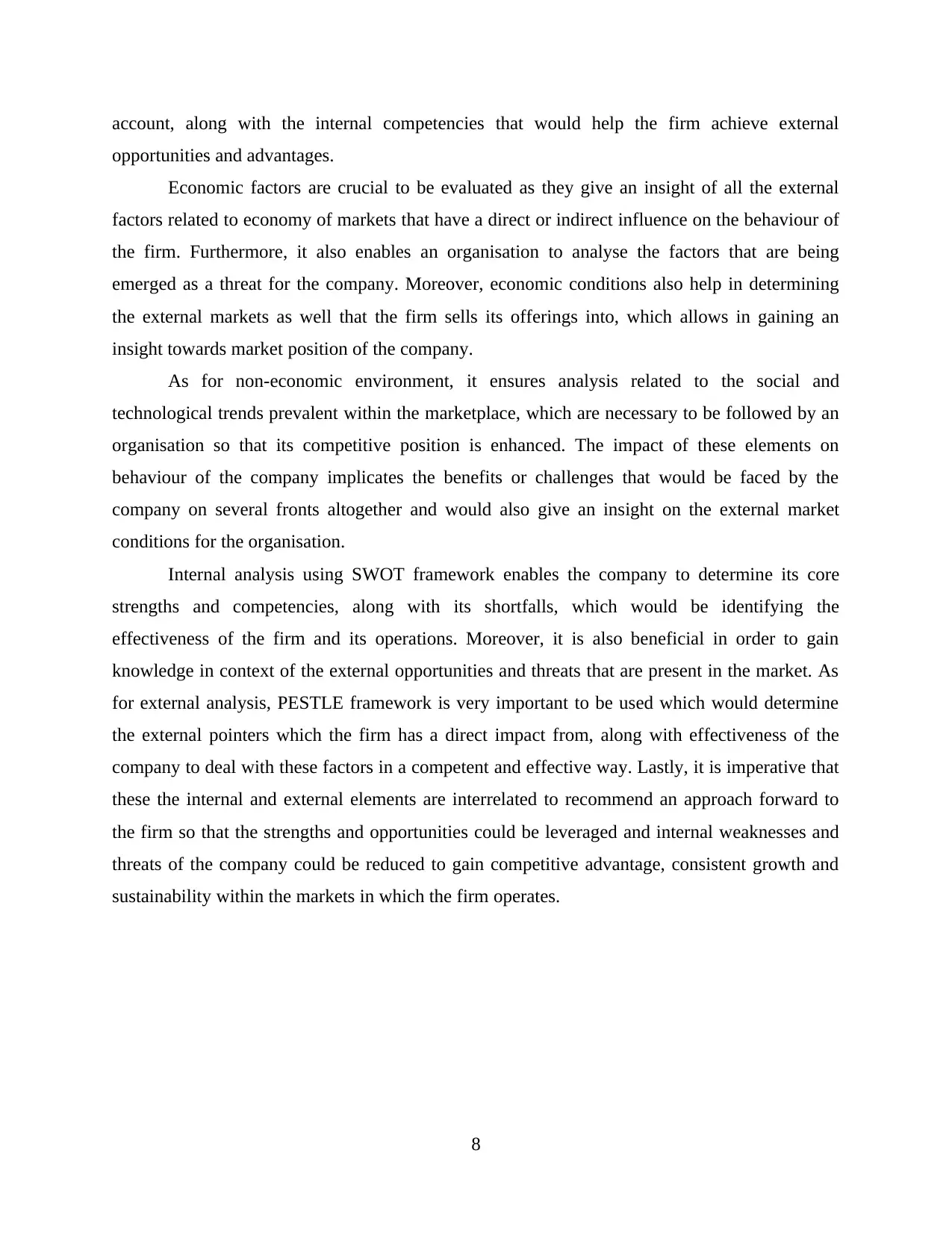
account, along with the internal competencies that would help the firm achieve external
opportunities and advantages.
Economic factors are crucial to be evaluated as they give an insight of all the external
factors related to economy of markets that have a direct or indirect influence on the behaviour of
the firm. Furthermore, it also enables an organisation to analyse the factors that are being
emerged as a threat for the company. Moreover, economic conditions also help in determining
the external markets as well that the firm sells its offerings into, which allows in gaining an
insight towards market position of the company.
As for non-economic environment, it ensures analysis related to the social and
technological trends prevalent within the marketplace, which are necessary to be followed by an
organisation so that its competitive position is enhanced. The impact of these elements on
behaviour of the company implicates the benefits or challenges that would be faced by the
company on several fronts altogether and would also give an insight on the external market
conditions for the organisation.
Internal analysis using SWOT framework enables the company to determine its core
strengths and competencies, along with its shortfalls, which would be identifying the
effectiveness of the firm and its operations. Moreover, it is also beneficial in order to gain
knowledge in context of the external opportunities and threats that are present in the market. As
for external analysis, PESTLE framework is very important to be used which would determine
the external pointers which the firm has a direct impact from, along with effectiveness of the
company to deal with these factors in a competent and effective way. Lastly, it is imperative that
these the internal and external elements are interrelated to recommend an approach forward to
the firm so that the strengths and opportunities could be leveraged and internal weaknesses and
threats of the company could be reduced to gain competitive advantage, consistent growth and
sustainability within the markets in which the firm operates.
8
opportunities and advantages.
Economic factors are crucial to be evaluated as they give an insight of all the external
factors related to economy of markets that have a direct or indirect influence on the behaviour of
the firm. Furthermore, it also enables an organisation to analyse the factors that are being
emerged as a threat for the company. Moreover, economic conditions also help in determining
the external markets as well that the firm sells its offerings into, which allows in gaining an
insight towards market position of the company.
As for non-economic environment, it ensures analysis related to the social and
technological trends prevalent within the marketplace, which are necessary to be followed by an
organisation so that its competitive position is enhanced. The impact of these elements on
behaviour of the company implicates the benefits or challenges that would be faced by the
company on several fronts altogether and would also give an insight on the external market
conditions for the organisation.
Internal analysis using SWOT framework enables the company to determine its core
strengths and competencies, along with its shortfalls, which would be identifying the
effectiveness of the firm and its operations. Moreover, it is also beneficial in order to gain
knowledge in context of the external opportunities and threats that are present in the market. As
for external analysis, PESTLE framework is very important to be used which would determine
the external pointers which the firm has a direct impact from, along with effectiveness of the
company to deal with these factors in a competent and effective way. Lastly, it is imperative that
these the internal and external elements are interrelated to recommend an approach forward to
the firm so that the strengths and opportunities could be leveraged and internal weaknesses and
threats of the company could be reduced to gain competitive advantage, consistent growth and
sustainability within the markets in which the firm operates.
8
Paraphrase This Document
Need a fresh take? Get an instant paraphrase of this document with our AI Paraphraser
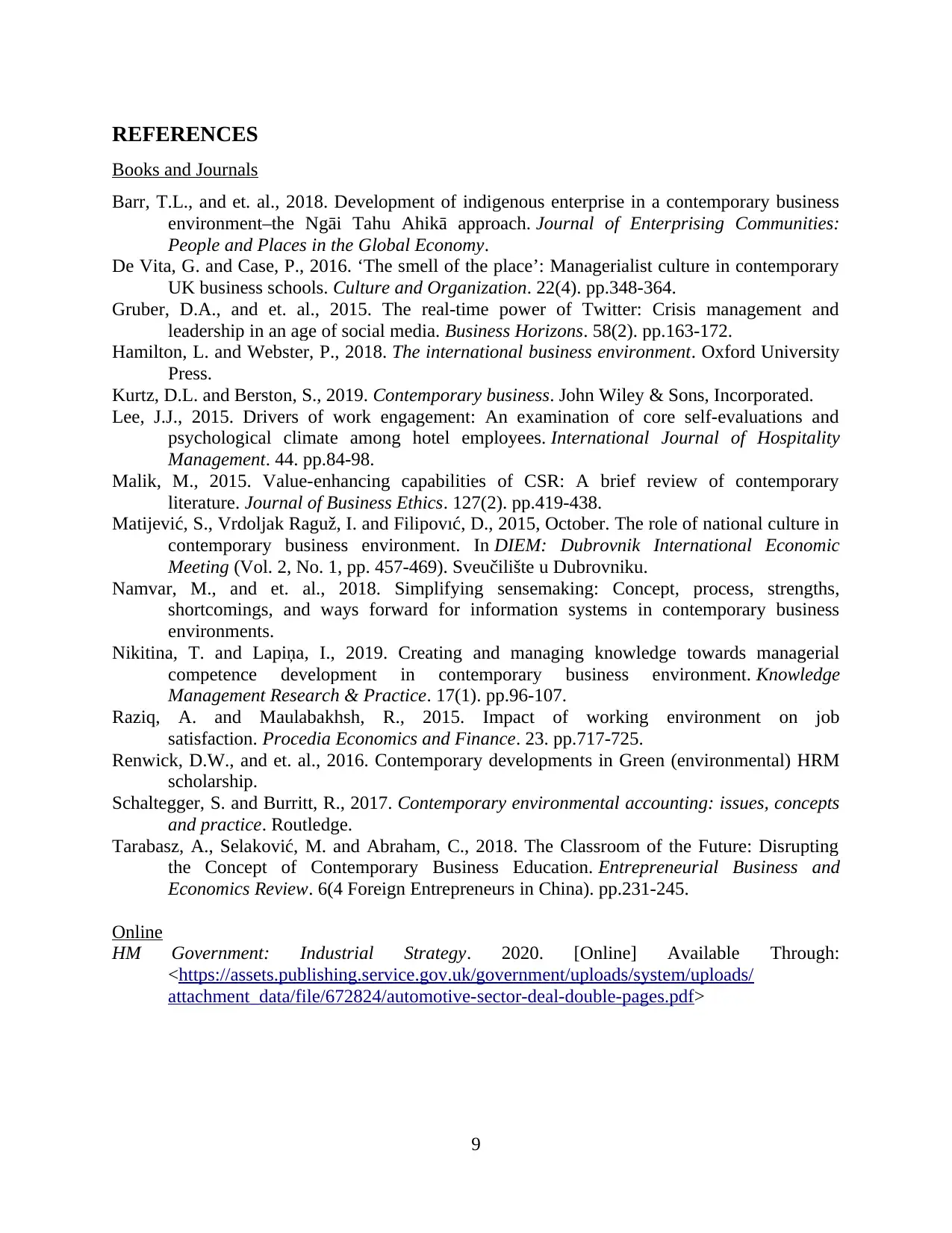
REFERENCES
Books and Journals
Barr, T.L., and et. al., 2018. Development of indigenous enterprise in a contemporary business
environment–the Ngāi Tahu Ahikā approach. Journal of Enterprising Communities:
People and Places in the Global Economy.
De Vita, G. and Case, P., 2016. ‘The smell of the place’: Managerialist culture in contemporary
UK business schools. Culture and Organization. 22(4). pp.348-364.
Gruber, D.A., and et. al., 2015. The real-time power of Twitter: Crisis management and
leadership in an age of social media. Business Horizons. 58(2). pp.163-172.
Hamilton, L. and Webster, P., 2018. The international business environment. Oxford University
Press.
Kurtz, D.L. and Berston, S., 2019. Contemporary business. John Wiley & Sons, Incorporated.
Lee, J.J., 2015. Drivers of work engagement: An examination of core self-evaluations and
psychological climate among hotel employees. International Journal of Hospitality
Management. 44. pp.84-98.
Malik, M., 2015. Value-enhancing capabilities of CSR: A brief review of contemporary
literature. Journal of Business Ethics. 127(2). pp.419-438.
Matijević, S., Vrdoljak Raguž, I. and Filipovıć, D., 2015, October. The role of national culture in
contemporary business environment. In DIEM: Dubrovnik International Economic
Meeting (Vol. 2, No. 1, pp. 457-469). Sveučilište u Dubrovniku.
Namvar, M., and et. al., 2018. Simplifying sensemaking: Concept, process, strengths,
shortcomings, and ways forward for information systems in contemporary business
environments.
Nikitina, T. and Lapiņa, I., 2019. Creating and managing knowledge towards managerial
competence development in contemporary business environment. Knowledge
Management Research & Practice. 17(1). pp.96-107.
Raziq, A. and Maulabakhsh, R., 2015. Impact of working environment on job
satisfaction. Procedia Economics and Finance. 23. pp.717-725.
Renwick, D.W., and et. al., 2016. Contemporary developments in Green (environmental) HRM
scholarship.
Schaltegger, S. and Burritt, R., 2017. Contemporary environmental accounting: issues, concepts
and practice. Routledge.
Tarabasz, A., Selaković, M. and Abraham, C., 2018. The Classroom of the Future: Disrupting
the Concept of Contemporary Business Education. Entrepreneurial Business and
Economics Review. 6(4 Foreign Entrepreneurs in China). pp.231-245.
Online
HM Government: Industrial Strategy. 2020. [Online] Available Through:
<https://assets.publishing.service.gov.uk/government/uploads/system/uploads/
attachment_data/file/672824/automotive-sector-deal-double-pages.pdf>
9
Books and Journals
Barr, T.L., and et. al., 2018. Development of indigenous enterprise in a contemporary business
environment–the Ngāi Tahu Ahikā approach. Journal of Enterprising Communities:
People and Places in the Global Economy.
De Vita, G. and Case, P., 2016. ‘The smell of the place’: Managerialist culture in contemporary
UK business schools. Culture and Organization. 22(4). pp.348-364.
Gruber, D.A., and et. al., 2015. The real-time power of Twitter: Crisis management and
leadership in an age of social media. Business Horizons. 58(2). pp.163-172.
Hamilton, L. and Webster, P., 2018. The international business environment. Oxford University
Press.
Kurtz, D.L. and Berston, S., 2019. Contemporary business. John Wiley & Sons, Incorporated.
Lee, J.J., 2015. Drivers of work engagement: An examination of core self-evaluations and
psychological climate among hotel employees. International Journal of Hospitality
Management. 44. pp.84-98.
Malik, M., 2015. Value-enhancing capabilities of CSR: A brief review of contemporary
literature. Journal of Business Ethics. 127(2). pp.419-438.
Matijević, S., Vrdoljak Raguž, I. and Filipovıć, D., 2015, October. The role of national culture in
contemporary business environment. In DIEM: Dubrovnik International Economic
Meeting (Vol. 2, No. 1, pp. 457-469). Sveučilište u Dubrovniku.
Namvar, M., and et. al., 2018. Simplifying sensemaking: Concept, process, strengths,
shortcomings, and ways forward for information systems in contemporary business
environments.
Nikitina, T. and Lapiņa, I., 2019. Creating and managing knowledge towards managerial
competence development in contemporary business environment. Knowledge
Management Research & Practice. 17(1). pp.96-107.
Raziq, A. and Maulabakhsh, R., 2015. Impact of working environment on job
satisfaction. Procedia Economics and Finance. 23. pp.717-725.
Renwick, D.W., and et. al., 2016. Contemporary developments in Green (environmental) HRM
scholarship.
Schaltegger, S. and Burritt, R., 2017. Contemporary environmental accounting: issues, concepts
and practice. Routledge.
Tarabasz, A., Selaković, M. and Abraham, C., 2018. The Classroom of the Future: Disrupting
the Concept of Contemporary Business Education. Entrepreneurial Business and
Economics Review. 6(4 Foreign Entrepreneurs in China). pp.231-245.
Online
HM Government: Industrial Strategy. 2020. [Online] Available Through:
<https://assets.publishing.service.gov.uk/government/uploads/system/uploads/
attachment_data/file/672824/automotive-sector-deal-double-pages.pdf>
9
1 out of 11
Related Documents
Your All-in-One AI-Powered Toolkit for Academic Success.
+13062052269
info@desklib.com
Available 24*7 on WhatsApp / Email
![[object Object]](/_next/static/media/star-bottom.7253800d.svg)
Unlock your academic potential
Copyright © 2020–2025 A2Z Services. All Rights Reserved. Developed and managed by ZUCOL.





